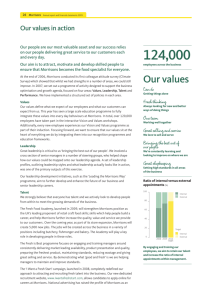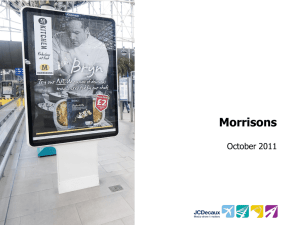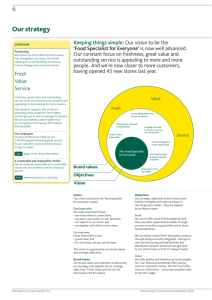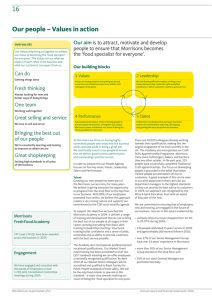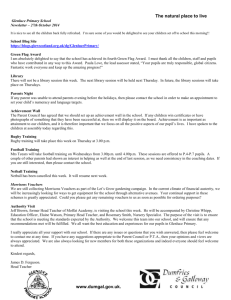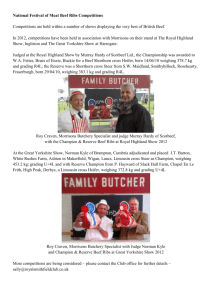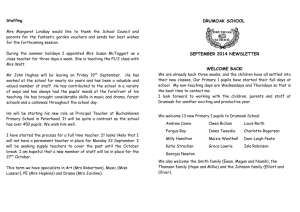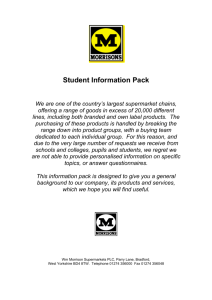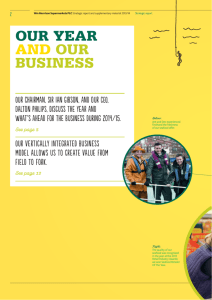Our Corporate Social Responsibility Report
advertisement
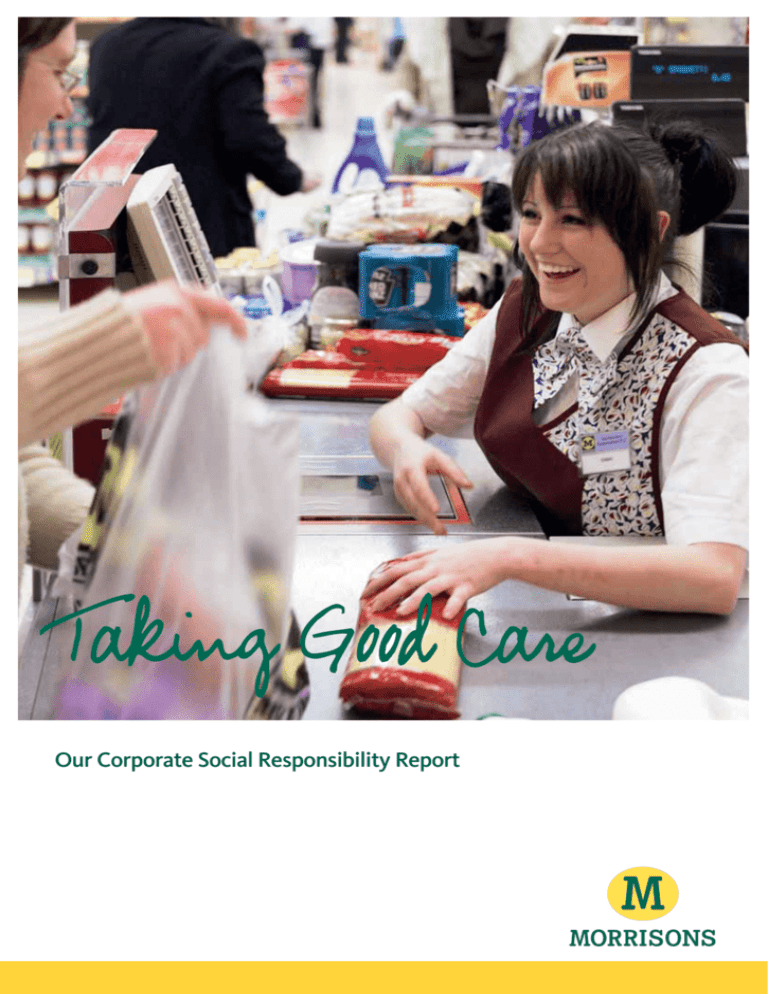
Our Corporate Social Responsibility Report Index 1 Chief Executive’s introduction 2 Managing Corporate Social Responsibility 4 Progress and highlights 4 Environment 4 Reducing our Carbon Footprint 8 Preventing waste 10 Source responsibly 13 Society 13 Being an employer of choice 15 Being neighbourly 16 Helping to encourage a better standard of living 18 Business 18 Product stewardship 18 Supply chain integrity 19 Satisfaction to all our stakeholders We are the UK’s fourth largest food retailer with 368 stores and 10.5m square feet of selling space. Our business is mainly food and grocery – the weekly shop. Uniquely, we source and process most of the fresh food that we sell through our own manufacturing facilities, giving us close control over provenance and quality. Some 9m customers a week pass through our doors, and our colleagues across the business work hard each day to deliver great service to them. Our service promise is recognised, by our industry, as the best in the business. Morrisons corporate social responsibility report 2007 1 Introduction from the Chief Executive We are determined to make a real difference and be a force for good, creating value for all our stakeholders Welcome to our first full Corporate Social Responsibility (CSR) Report, which outlines our commitment to taking good care environmentally, socially and in our business. Our Group is underpinned by a proud heritage and driven by strong principles, with quality, value and integrity at the heart of our business strategy. We have a clear vision to be “the food specialist for everyone” and in acknowledging our wider social and environmental responsibilities, our goal is to be recognised for building a sustainable business based on trust, loyalty and shared-value attributes. How we go about our business is very important to us. We invest in our people, our offer and our customer relationship and experience, aiming to be a well-run company that grows and thrives; and contributes to prosperity over the long-term. Sustainability makes sense environmentally, socially and in our business. By ‘doing the right thing’ we can help protect and nurture the valuable resources on which we all depend, making our business more efficient and effective, whilst also recognising the opportunity to meet the growing demand for sustainable products and services. In line with our commercial objectives and our vision for the future, we have laid out our roadmap for CSR. We are reducing our Carbon Footprint, saving energy and increasing our transport efficiency; preventing waste and recycling more. We are also continuing to invest in more local and sustainable sourcing and enabling our customers to eat healthily, whilst ensuring a wide choice of quality, fresh, affordable foods. Combating climate change is a huge task, which we must all embrace. We recognise that we have both a responsibility and an opportunity to be part of the solution. In doing our bit to address this unique challenge, we will also involve our customers and our suppliers and support them as they try to do their bit too. We do not claim to have all the answers. There is a lot of hard work to be done and some changes may take time but through positive engagement and by taking good care in all we do, we are determined to make a real difference and be a force for good, creating value for all our stakeholders. We view sustainable development as integral to the way we do business and as such, it is our ‘licence to operate’. Marc Bolland Chief Executive 2 Morrisons corporate social responsibility report 2007 Managing corporate social responsibility Responsibility for CSR starts with our Board of Directors. Reporting into the Board is a cross-functional steering group of senior executives from the key business areas, which provides leadership and puts ownership of CSR strategy with management at an operational level. This group meets a minimum of six times a year and its terms of reference are to: > Oversee and implement the Group’s strategy and approach to CSR matters and embed commitments into the day to day operation of the business. > Identify and consider emerging issues and legislative developments. Recognise and assess opportunities to assist business planning and address stakeholder requirements or concerns. > Manage CSR risk and address the various issues arising in a practical and commercial way and always with integrity. > Provide recommendations on policies, procedures and processes in line with Group values, CSR commitments and sustainable development opportunities. > Report to the Board, ensuring that the appropriate management, evaluation and verification systems are integrated into the core business functions to monitor delivery against targets by means of Key Performance Indicators. > Implement procedures to report publicly on progress and the extent of compliance with company policies, procedures and commitments. Stakeholder engagement We listen to and talk with employees, customers, investors, regulators, suppliers, Non-governmental organisations (NGOs) and community representatives, which helps us to identify and tackle our key issues and ensure that we are dealing with what matters most to our business and those involved with it. In the past year we asked lots of people to talk to us about their experiences and views of Morrisons. Some of the feedback came through structured, formal market research covering over 3,000 customers and 8,000 colleagues. Some came from talking to people – customers, colleagues and suppliers around the country – and hearing their views. We gained a clear picture of the things we do well, what we should concentrate on and the issues we face. We found real strength in Morrisons. Our customers appreciate the value we offer, our high standards of product availability and our industry-leading in-store service. They recognise our unique features such as our in-store butchery, fishmongery and bakery skills, our popular cafes and the fact that we control key parts of the fresh food supply chain through our manufacturing businesses. They are interested in great food, which is also great value; and these are our great strengths. We also found interest in the provenance, quality and health aspects of food and in the impact of big business on the environment. We have some more work to do, in some cases, to communicate better the many good things we already do. This report marks the start of sharing more information on CSR matters and the progress we are making in our programme towards our targets for achievement. On-going work is co-ordinated through our CSR programme team, with delivery of activities undertaken through line management in each of the business divisions and driven through various multi-stakeholder working groups. Our CSR strategy During what has been a period of strategic review for the business under the leadership of our new Chief Executive, Marc Bolland, and after consultation with a number of key stakeholders, we re-considered our CSR priorities and further structured our approach around three principal areas. Environment Taking good care of our planet. Climate change, waste, sustainability Society Taking good care of our shoppers, our colleagues and their communities. Work, neighbours, living Business Taking good care as we go about our business. Sourcing, supply, engagement From this we have established a CSR programme that is integrated with our Company’s vision to be “the food specialist for everyone” and aligned to delivering our brand values of freshness, service and value. This programme outlines our priorities to the end of 2010 and the targets we aim to achieve. Morrisons corporate social responsibility report 2007 3 Commitments KPIs Targets 2007 to end 2010 Energy efficiency and performance • • • • • Refrigeration management • Replace Hydrochloroflurocarbons (HCFCs) with Hydroflurocarbons (HFCs) by 2010 • Trial CO2 system Environment Reduce our Carbon Footprint Prevent waste Reduce Carbon Footprint cumulatively by 36% by 2010 (based on 2005 emissions) Reduce Group energy use by 8% per square metre (sqm) by 2010 (based on 2005 emissions) 10% of energy from renewable sources by 2010 Air-freighted produce to be labelled for customer choice/information Carbon labelling to be explored Water conservation • 15% reduction in Group water use by 2010 Transport efficiency • Plan to save 8% of our haulage CO2 emissions by 2010 (based on 2005 emissions) through mileage reductions and increased efficiencies • Reduce road miles travelled per pallet of stock by 6% by 2010 and achieve an 8% reduction of total empty road miles travelled • Enhance transport planning systems to achieve a 10% increase in trailer utilisation by 2010 • Introduce cleaner Euro5 engines to 15% of fleet by end 2007 and 80% of fleet by 2010. • Extend availability of BioEthanol E85 fuel on forecourts Optimisation • Volume of waste to landfill reduced by 50% by 2010 Reduction • Use 15% less own brand packaging by 2010 • Reduce environmental impact of standard plastic carrier bag use by 25% by end 2008 Reuse • Extend returnable tray trips by 14m by 2008. Grow future use in line with sales Recycling • • • • • Responsible sourcing principles/policies • Use only timber which is recycled or certified as coming from a sustainable source by 2010, including 100% of wood derived marketing materials. • 100% of own brand tissue paper lines to be certified by the Forest Stewardship Council (FSC) by end 2007 • 100% of own brand fish to comply with sustainable sourcing policy by 2010 • 100% of own brand shell eggs to be free range by 2010 Good choice of organic, Fair Trade, local and in-season food • Increase the range of organic foods available by 40% by end 2007 • Label all produce with country/place of origin • Foster responsible methods of agriculture and biodiversity Be an employer of choice Happy and engaged workforce • Continue to increase colleague stability, focusing on engagement and involvement, including a regular colleague survey • Continue to focus on training, development and promotion to further improve retention Be neighbourly Community relations and supporting good causes • Support communities by giving to good causes that reflect local need • Choose and support a Charity of the Year for national fundraising, aiming for at least £1m donated each year Help encourage a better standard of living Quality, choice and value for all • • • • • Providing clear, easy to understand information for our customers’ informed choice • All own brand foods to carry front of pack Guideline Daily Amount (GDA) labelling by March 2008 • 100% of own brand products with ‘Big 8’ back of pack labelling where space allows Nutritional policies and advice • • • • • • Product stewardship Specification and traceability systems implementation Food safety/quality standards Assurance/accreditation Responsible sourcing guidelines • Invest in a new data system to improve the efficiency of accessing information about our products • Ensure consistently high standards of food quality and safety • 100% fresh produce suppliers: Assured Produce/EUREPGAP • 100% of fresh meat from farm assured sources and produced to high welfare standards Supply chain integrity Fair and ethical trading standards • Seek to implement our Ethical Trading Code in respect of non-food suppliers in Asia, farmers in Africa and wine suppliers in South America by end 2007 • Seek to implement fair working conditions auditing initiative in China by end 2007 Being a decent and loyal customer to our suppliers • Adhere to the ‘Supermarkets Code of Practice’ • Build long-term partnerships with suppliers • Observe the Morrisons ‘Buyers Charter’ Stakeholder engagement Delivering our promises • Engage positively with all stakeholders, responding to them swiftly and efficiently Source responsibly Increase the proportion of recycled available store waste from 72% to 80% by 2010 Extend compostable packaging to 200 lines by end 2007 Increase the opportunities for customers to recycle at and through our stores Start to introduce symbols on our packaging to make it easier for customers to recycle Increase recycled content of standard plastic carrier bags to 25% by end 2008 and 50% by 2010 Society Be “The food specialist for everyone” Deliver great food, which is also great value for every day Be famous for special offers Be renowned for preparing and selling great fresh foods Make the most of our in-house fresh food manufacturing and processing facilities and produce packhouses, to deliver food specialist credentials. • Provide industry-leading standard of customer service Increase our healthy ‘Eat Smart’ range by 70% by end 2007 Increase ‘Free From’ range by 30% by end 2007 Meet the Food Standards Agency’s 2010 salt reduction targets early, by end 2008 Remove hydrogenated fats from own brand products by end 2007 Continue to implement the ‘Task 21’ scheme as part of our approach to responsible drinking Provide information to customers about healthy eating in our stores and through our web site Business Satisfaction for all stakeholders 4 Morrisons corporate social responsibility report 2007 Progress and highlights Environment Reducing our Carbon Footprint Working with the Carbon Trust, we have determined the Group’s Carbon Footprint, which is established from the emissions of carbon dioxide from sources including energy usage, transport and waste. Morrisons Carbon Footprint covers our stores, depots, all transport (Group-owned and third party haulage) and also our in-house supply chain of manufacturing, processing and packing facilities. It is being used as a measure of our carbon emissions for the Group and taking 2005 as the baseline, we aim to reduce our Carbon Footprint cumulatively by 36% by 2010. In the past 12 months we have achieved a 6.6% reduction in our total Carbon Footprint of 90,874 tonnes. 1,283,050 1,373,924 2005 0.35m 0.70m Total CO2 equivalent emissions from energy (electricity & gas) used by the Group 764,221 20061 tonnes CO2/£m 63.1 718,318 57.4 (Calculated using Department for Environment Food and Rural Affairs (DEFRA) reporting guidelines.) (1Our reporting method was changed in 2006 to start from the beginning of the calendar year). This has been achieved by: > Using the Group’s energy management and monitoring system, Optima, which facilitates targeting areas of high energy use. > As part of the on-going monitoring process, 15 sites Morrisons Carbon Footprint* 2006 2005/06 tonnes CO2/£m 1.05m 1.4m Tonne of CO2 *Calculated by the Carbon Trust identified with unusual or fluctuating energy consumption levels have been separately audited to assess their gas, electricity and water usage, with average savings of 5% having already been made as a result. > Implementing our ‘Energy Eye’ system of monthly measurement and targeting of energy consumption at our sites, monitored by a designated ‘Energy Engineering Group’. To achieve reductions in our emissions, we are continuing to implement a carbon and energy strategy for the business based on: > Measurement and targeting of refrigeration, with > > > > > Climate Change Agreements in operation at 202 stores measuring and monitoring energy consumption implementing ‘good housekeeping’ policies introducing additional energy saving technologies sourcing and generating renewable energy Our target is to reduce Group energy use by 8% per sqm by 2010, based on 2005 emissions. We are primarily focused on where we can make the biggest impact, which is on reducing energy used at our sites, most notably for refrigeration. However, across the Group, we have achieved a reduction in CO2 equivalent emissions from energy (electricity and gas) of 9% over the past year. fixed and locked set points for improved efficiency and re-commissioning of all refrigeration systems. and 9 manufacturing sites, aimed at reducing the energy used in food production. > Introducing an ‘Energy Awareness’ campaign involving the training of over 100,000 colleagues throughout the business. > Issuing a ‘Good Housekeeping’ guide and a supporting policies document. We have achieved accreditation for energy efficiency under the Carbon Trust’s Energy Efficiency Accreditation Scheme, which is managed by the National Energy Foundation. The awarding body is the Energy Institute which recognises good practice in energy management. Morrisons corporate social responsibility report 2007 5 “Switching On to Switching Off ” On the basis that energy saving starts with some simple, practical measures, last year’s introduction of the ‘Good Housekeeping Guide’ marked Phase 1 of our Energy Awareness strategy. Phase 2 saw the launch in October 2006 of a major ‘Energy Awareness Campaign’ throughout the business. Over 100,000 colleagues have been trained in “Switching On to Switching Off”, which promotes a series of common sense initiatives enabling everyone to contribute to saving energy. Performance is monitored through designated ‘Energy Champions’ at every location and measured centrally. Each month, stores receive a graph showing their energy consumption performance compared to last year to encourage them in making further progress. Average energy savings of 4.7% were achieved across our stores over the first two months of the campaign. The initiative continues and it has recently been extended to include our manufacturing sites. In addition, our energy group (which reports into the CSR Steering Group) is looking at ways of further increasing energy savings across the business. This working group meets on a monthly basis and consists of senior managers from across the business to enable our energy strategy to apply across the whole Group. Energy saving technology We specify that contractors for any of our new-build projects must purchase equipment from a government approved ‘energy technology product list’. Everything on this list, from heating and refrigeration equipment to lighting, is designed to significantly reduce or eliminate the production of carbon dioxide. In 2006 we invested £10m in energy-saving technology. Renewable energy We are trialling a micro wind turbine for generating electricity at our Leominster store. Installed on the roof of the store, it is being used to run part of the refrigeration plant. The test was highly commended in The Cooling Industry Awards 2006 and we are planning to install the same technology at a number of other sites. Feasibility trials for a larger wind-generated electricity system are also underway at our Regional Distribution Centres. Other initiatives for low carbon energy being explored include Combined Heat & Power (CHP), for generating electricity in supermarkets and re-using more heat including from the refrigeration system in stores. Further projects for renewable energy are being investigated in conjunction with the Carbon Trust. Leominster store wind-turbine. 6 Morrisons corporate social responsibility report 2007 Environment continued Saving Water Our target is to achieve a 15% reduction in group water use by 2010. We are taking steps to reduce water consumption. Measures include the installation of “Opti-flush” water control devices in cisterns and the use of push taps on wash hand basins. In March 2006 we moved into our new, purpose built Head Office, Hilmore House, in Bradford, which features some of the most efficient and environmentally aware building control systems. These include collecting rain water, which is recycled and re-used, for example in the washrooms. To date we have achieved a peak of 40% of the water used in the building being supplied from rainwater. In addition, the lighting system is sensor controlled and thermal conditions are balanced between solar gain coming from a central glass atrium and free-cooling at night. Analysis has shown that compared to a similar building housing 1,400 people, the new Hilmore House uses 33% less energy. We are currently working with Yorkshire Water, auditing six sites as a pilot scheme to identify further ways of saving water. It is expected that this pilot will lead to a benchmark for the most efficient water use in stores, which will be referenced across the estate to achieve savings. We are also working with Waterscan to identify and fix leaks promptly and to audit stores. BioEthanol E85 fuel On March 15th 2006, Morrisons opened the UK’s first BioEthanol E85 fuel filling pump at Norwich, tying in with the first deliveries of the Saab 9-5 Bio Power flexfuel car. The fuel is branded as Harvest BioEthanol E85, with the environmentally friendly pumps featuring a butterfly logo. It is now available at 14 sites and is being introduced to all new store filling stations. We intend to further increase availability as demand increases, believing that E85 offers an effective way to rapidly increase the percentage of renewable fuel used in motor vehicles, delivering a significant contribution to reducing CO2 emissions. BioEthanol E85 is produced from a wide variety of agricultural produce, including forest residue, sugar cane, sugar beet, and grain, making it a totally renewable and sustainable fuel source. Refrigeration A variety of proven energy saving technologies and methods covering engineering design, controls and equipment specification are used to reduce consumption. We are replacing HCFCs with HFCs and our target is to complete this process by 2010, in line with European Union regulations. We have used secondary refrigerants since 1995 and we will be trialling a CO2 system as an alternative to HFC. Transport efficiency We plan to save 8% of our haulage CO2 emissions by 2010 (based on 2005 emissions) through mileage reductions and increased efficiencies; and to reduce road miles travelled per pallet of stock by 6% by 2010. We will also be improving the space utilisation of our vehicles and increasing back-haul pallet volumes. We are introducing vehicles with cleaner Euro5 engines into our fleet, rather than the currently required Euro4 and well ahead of these engines becoming a requirement in 2009. These are more efficient and cleaner engines, which will help to reduce emissions. Rigorous maintenance schedules, new engineering developments and fuel efficiency programmes, as well as driver training, are also aimed at helping to reduce the environmental impact of our transport fleet. For example, our new fleet vehicles will have long-drain oils giving 100,000km between drain intervals, which will save around 14,000 litres of oil per year. In addition, we remould 9,000 tyres per year saving over 675 tonnes of rubber. Morrisons corporate social responsibility report 2007 7 Energy efficiency in-store: Cardiff We consider the environmental aspects of all new-build stores. Each is designed individually, creating buildings with style and character that are sympathetic to their locations and which meet the needs of the community they serve. Our policy is to cut the carbon emissions from the energy used for building services through responsible energy sourcing, by using state of the art technologies and energy efficient practices and in our specification for construction, installation, maintenance and monitoring of plant. Our new store at Grangetown, Cardiff, which opened on 6th November 2006, is built on a nine acre brown-field site that was formerly a domestic refuse tip. Around 80% of the materials used in constructing the framework of the store, including aluminium and clay blocks, can be recycled. We have a history of using and re-using such building materials where they are available. Integral to the store’s design is an eight metre high glazed wall enabling natural light to spill through the building, eliminating the need for artificial light. A nine metre deep canopy over the checkout mall provides shade, minimises solar glare and prevents heat gain, reducing the need for air conditioning/climate control while the heating system recognises natural warmth and runs at maximum efficiency by matching heat output to the building’s actual needs at a given time. The warehouse has overhead radiant tube heating that keeps colleagues warm while preventing the unnecessary heating of large air volumes arising from Cardiff Store. open loading doors. It switches off automatically if the loading doors are left open for more than 15 minutes. Lighting in the staff canteen is programmed to switch off when there is sufficient natural daylight, while infra-red light movement sensors in other recreational and work areas ensure lights switch off automatically when the space is unoccupied. The automatic lighting control system in operation at the petrol filling station has reduced the amount of artificial light used outside of trading hours. Energy savings equivalent to a 10% reduction in carbon emissions are anticipated from the technology specification in refrigeration and plant design. Refrigeration systems are assessed using Total Equivalent Warming Impact and are monitored remotely to run at peak efficiency. Large surface air condensers are fitted with electronically commutated fans and motors for lower power consumption and noise impact. Night blinds on refrigerated display cases descend automatically, initiated by the store’s master time clock and insulated curtain strips are installed to the doors of chilled and frozen food store rooms. These measures reduce cool air loss and increase energy efficiency. ‘Smart’ equipment specification is another feature. The bakery ovens are specified to be energy efficient and feature an automatic ‘shut-off’ facility when un-used for a pre-set period of time. Measures have also been taken to reduce water consumption, such as the installation of ‘Opti-flush’ water control devices in cisterns and the use of push taps on wash hand basins. 8 Morrisons corporate social responsibility report 2007 Environment continued Preventing waste We aim to prevent waste through a sustainable waste management strategy that focuses on optimisation, reduction, reuse and recycling. Where disposal is the only practical option available, we use appropriately licensed waste management facilities in accordance with legislation. All of our stores have the capability to recover cardboard and polythene, which are the largest contributors to waste produced in store. Currently 72% of all store generated waste is recovered for recycling. Store Waste analysis Total Store Waste Generated Recycled Material 2006/07 198,500 Tonnes % Cardboard/paper 119,000 60 13,000 7 Plastics Other recovered Recycled Total Waste to landfill 10,000 5 142,000 72 56,500 28 Reducing packaging Our target is to cut own brand packaging by 15% by 2010. Our objectives are to use less packaging and to avoid packaging waste being sent to landfill, wherever possible. We are actively addressing packaging waste by aiming to ensure that we use no more packaging material than is necessary to protect and transport the products safely, whilst maintaining the necessary levels of safety, hygiene, quality and consumer acceptance of the packed product. By 2010, we aim through a number of initiatives to recycle, recover or re-direct 50% of the current waste stream away from landfill against the 2005/06 baseline. Management initiatives in our stores have seen the recovered tonnage for recycling increase by some 27% this year. Recycling Data Tonnes Per Store Recycling In addition to recovering back-door waste for recycling, wherever possible we aim to offer our customers the chance to recycle materials including paper, aluminium, glass, clothing, shoes, books, CDs and plastics. Other initiatives have included mobile phone recycling in aid of our Charity of the Year (last year Breast Cancer Campaign, this year Asthma UK), Christmas card recycling in partnership with the Salvation Army and offering inkjet cartridge recycling through the Woodland Trust, which has so far enabled 900 trees to be planted. All our stores also provide facilities for carrier bag recycling. Year No. Total Stores Tonnage Recycled Year on Year % change 2004/05 144,000 579 249 ** 2005/06 128,000 423 303 22% 2006/07 142,000 368 386 27% **No accurate date available for the integration of the Morrisons and Safeway estate. We have an extensive system of returnable baskets for both internal and external stock movements, which are continually reused through our distribution network and between suppliers. These replace cardboard and other packaging used to transport and display products and are most prevalent in our fresh food areas. In the past year the number of basket trips has increased by over 9% to 144 million, which is estimated to have saved approximately 65,000 tonnes of cardboard. Our use of returnable baskets is expected to continue to grow at least in line with sales. We use a range of packaging types and formats that are designed to be efficient throughout a product’s entire lifecycle. When designing packaging we aim to ensure it serves its purpose well, aiming to minimise weight and volume and following the principles of reduce, reuse and recycle. Some form of packaging is often essential. It protects, meaning products can travel and arrive without damage. It keeps foods safe, fresh and in good condition and it carries essential information such as lists of ingredients, nutrition and cooking instructions. However, we will be reducing packaging wherever we can and looking for more sustainable and recyclable sources. We are making changes and to help us with our decisionmaking, we are implementing ‘Packaging Guidelines’ across the business, which are based on consideration of the following principles: • • • • • Optimisation Recycled content Materials’ recyclability Materials’ sustainability Minimising use of non-renewable resources used in packaging Morrisons corporate social responsibility report 2007 9 Compostable packaging Compostable packaging has been introduced to our Organic fresh produce range, saving 27 tonnes of plastic packaging and 4.5 tonnes of moulded fibre from going to landfill this year; figures that are set to increase as the packaging is extended to more lines. GM-free corn starch. These materials naturally break down in a compost heap over a period of between 6 and 24 months. The packaging is highlighted with a seedling logo and compostability accreditation standard; and includes clear instructions for pack disposal. Trays are made out of sugar cane fibre, flow wrap film is made from wood pulp and bags are produced using Packaging reduction projects, such as changes to meat packaging, sandwich and salad packs and a re-design of our wine carriers, together with the introduction of compostable packaging to organic produce lines, are already saving over 30 tonnes of packaging waste a year. Our packaging group (which reports into the CSR Steering Group) is working to further reduce the environmental impact of our packaging by identifying more ways to design out packaging waste growth by 2008 and deliver absolute reductions in packaging waste by the end of March 2010, to meet the shared objectives of the WRAP (Waste Resources and Action Programme) Courtauld Commitment, to which we are signatories. This also includes a commitment to tackling the amount of food waste consumers throw away, by the end of 2010. Carrier bags Being focused on reduce, reuse and recycle, our standard plastic carrier bags are designed to offer exceptional performance with a minimum of resources used in their production and also to be reusable. Our target is to reduce the environmental impact of standard carrier bag use by 25% by the end of 2008. To date we have achieved a 5% reduction in use through an active management policy at our checkouts. To achieve further reductions in use, in addition to our multi-trip ‘Charity Bag’, which is made from 100% recycled material and is also recyclable, we are introducing a small and a large size durable woven shopping bag, which can also be recycled, together with a shopping bag made of jute, which is a natural fibre that is biodegradable. Smaller size carrier bags are available for convenience shopping to prevent the use of the full size bags. Messaging on all our bags provides customers with information on the further use and means of disposal. As stated previously, all of our stores have carrier bag recycling units for our customers’ use, situated in prominent positions in main entrance areas. 10 Morrisons corporate social responsibility report 2007 Environment continued Source responsibly We seek to ensure that own brand products and the ingredients that go into them are produced as responsibly as possible. This means applying responsible sourcing policies to cover specific raw materials such as timber, palm oil and soya and addressing issues such as sustainable seafood sourcing and animal welfare. Policy information can be found at www.morrisons.co.uk, in the Corporate Social Responsibility section. Innovative fresh fish labelling We actively promote sustainable seafood and in a move that is a first for fresh fish sold in supermarkets, in October 2006, we launched a new labelling scheme nationwide, aimed at giving customers every confidence that the fish we sell has been sourced responsibly. All the fish on the counter can now be recognised by both their common and scientific names, which clearly distinguishes each species and prevents confusion where more than one common name is used. The new labels also give the origin of the fish i.e. the country, area of water where it was caught or farmed and the catch method. Our new labels clearly distinguish each species. Freedom Food Free Range Duck We are the first supermarket to sell RSPCA Freedom Food labelled Free Range Duck, which was launched in November 2006. In addition to introducing The Best Breckland Duck we also launched Wye Valley Chicken, extending our range of Freedom Food labelled poultry. Steven Tait, Head of Freedom Food Sales and Marketing, commented: “Animal welfare is an increasingly important consideration for the consumer. The Freedom Food label provides consumers with the assurance that the product has come from animals reared on farms assessed to strict RSPCA welfare standards; the RSPCA being one of the most respected animal charities in the world. We are delighted that Morrisons is leading the way in its commitment to selling poultry from Freedom Food approved farms, and to improving animal welfare.” Responsible sourcing also means offering a good choice of Organic, Fair Trade, British and locally-sourced produce. Buying British and local We are committed to providing our customers with the freshest produce possible throughout the year. We process 80% of the fresh produce and 90% of the fresh meat we sell through our own facilities. When the quality, quantity and value are there we will always source British first. We have consistently sought to work with the British farming industry to source as much produce as possible from UK farmers and growers. For example, when in season we are 100% British for carrots, broccoli, swede, cauliflower and 90% for onions, mushrooms and potatoes. Overall, 75% of the vegetables and 90% of the plants that we sell throughout the year are British. Our fresh milk, fresh and frozen poultry and in-season lamb and deli sausage and bacon, are 100% British, and 95% of our fresh beef and fresh pork is British too. We buy a large amount of primary produce directly and have many long-standing relationships with farmers and growers, with some dating back over 30 years. We work in collaboration to develop the quality, safety and marketing of fresh foods and to shorten the food supply chain, by working closely together. Morrisons corporate social responsibility report 2007 11 Longley Farm We have a long-standing working relationship with Longley Farm spanning 46 years, of which both parties are proud. We have grown together, learning, developing and helping each other throughout our journey to strive for retail success. In 1948 Joseph and Edgar Dickinson inherited a ‘typical Pennine farm’ and the two brothers developed a smallholding from a herd of 10 cows, which were milked by hand. In 1956 they were granted a licence to buy milk from other farms and began to build up to a modest daily intake of 200 gallons, selling over a 30 mile area. They began delivering their famous dairy products to Morrisons first supermarket back in 1961. Since then, Longley Farm has grown into one of the largest independent dairies in the country. Jim Dickinson, Managing Partner of Longley Farm, said: “Good relationships are crucial to any business and over the years we have supplied Morrisons with a traditional, good quality product – whether it be cream, yoghurts, cottage cheese or butter – whilst in return they have given clear communication channels and regular contact with a stable core of people, to build up both businesses side by side.” CM Mercer The 16 year partnership between Morrisons and family run potato growers CM Mercer is an example of what can be achieved with good, open and honest communication. The Mercer family relocated from Lancashire to Bowley Court Farm, Herefordshire, in 1972, where they now farm potatoes on over 1,000 acres, with the help of over 40 employees. The farm supplies Morrisons with a number of potato varieties including bakers such as Marfona, Maris Peer new potatoes and loose potatoes such as Estima. Working closely with CM Mercer we have also been able to launch a line of new potatoes under The Best range, which offers premium products of exceptional flavours and tastes. This further highlights the quality of their produce, which has seen an increase in sales to Morrisons by over 90% since the relationship began. ‘Morrisons quality standards are very high and that is why we only supply them with the freshest potatoes’, said owner, Jon Mercer. ‘We have an exceptional relationship with Morrisons and we strive to provide their customers with the very best potatoes’. 12 Morrisons corporate social responsibility report 2007 Environment continued We are keen supporters of regional producers and have many small and local suppliers. We also tailor local products to local stores. For example, Kelly’s ice cream and Sharpe’s Eden Ale in Cornish stores; apples, plums, cherries and cauliflower, when in season from Kent are available in our stores in Kent; and Elsdon Goats cheese and Northumbrian Onion & Chive cheese in our Northumberland stores. There is a full range of regionally sourced cheeses available from every store’s deli counter. Calon Wen. South Caernarfon creameries. Welsh Pantry’s Faggots and Peas Welsh range rolls and Welsh cakes, which are supplied to the majority of our stores in Wales has been extended to include two premium wholemeal brown sliced loaves, a sliced fruit loaf and soft white baps. When you visit a Morrisons store in Wales you’ll find a selection of over 230 locally sourced fresh and frozen Welsh products to choose from. Every effort is taken to ensure that each store’s product offering is tailored to meet the demand of its customers, reflecting the tastes and preferences of the local area. Own brand products produced by Welsh suppliers, such as Morrisons Cheddar cheese supplied by South Caernarfon Creameries, sit alongside other Welsh cheese varieties such as Y-Fenni, Tintern and Cadog and popular local brands. Wherever possible we have worked with suppliers to extend the range of Welsh products available to customers. For example, Braces Bakery’s range of bread In addition, we aim to forge new relationships with local suppliers, such as Welsh organic dairy farmers Calon Wen, who now supply milk to all our Welsh stores and the Welsh Pantry, which supplies ready meals such as faggots and peas and Cawl Mamgu (Granny’s Broth). We also look for opportunities to work closer with the farming community and offer a full range of Welsh beef and lamb on the butchers’ counter, as well as loose new potatoes from Pembroke. Morrisons corporate social responsibility report 2007 13 Society Being an employer of choice We employ 117,000 people in stores, factories, depots and offices. Our comprehensive employment policies cover all aspects of our colleagues’ careers with us. These include recruitment, selection, remuneration, training, education, development, retention, performance appraisal, equality and diversity. We keep colleagues fully informed about the activities of the business through internal publications, communications programmes, notice boards, briefings, consultative committees and forums. Our special complaints procedure is designed to protect all employees against any form of abuse and includes provision for confidential whistle-blowing if appropriate. We have also implemented what will be a regular colleague survey, which investigates employees views about working for Morrisons, highlights what needs to be done to make the Group an even better place to work and sets a benchmark against which to monitor and measure change and improvement. A more detailed understanding of the findings is obtained through carefully targeted focus groups, on which a complete follow-up programme will be based. We have constructive relationships with a number of trade unions and the largest membership is with USDAW, with whom we have a partnership agreement. We encourage involvement in the financial performance of the business through Profit Share and Share Option schemes. We have a team of Occupational Health nurses and a full time Medical Advisor who focus on the health and wellbeing of all our colleagues. Training and Development We invest significantly in the training and development of our people, enabling them to do their jobs to the very best of their ability and to offer our customers the very best service. Our own training department runs an extensive range of programmes, particularly aimed at retail skills and specialist craft training. We also partner with educational establishments to offer a range of recognised qualifications. Graduate Training Cheryl Henson joined Morrisons Graduate Training Scheme in September 2005. “The programme was fast paced and I immediately got involved in all areas of store operation. I particularly enjoyed training on Market Street including the Bakery and Cake Shop, working alongside skilled crafts people. The immediacy of responsibility encountered and the short period of time which it takes to reach senior management positions is both highly stimulating and challenging” said Cheryl, who is Assistant Deputy Manager at the Livingston store. 14 Morrisons corporate social responsibility report 2007 Society continued Company award schemes Butchery The Jack Woodhead Award Scheme was established in memory of a Director of our meat processing facility in Lancashire. The scheme is designed to recognise the high level of meat trade skills within our business, as well as a celebration of the excellence of our butchery operation. Robert Sykes of Thornton Cleveleys store was named Top Butcher, Steve Beard of Fishponds, Bristol, won Butchery Manager of the Year 2006 and Mark Thompson of Woodhead Bros received the award for Trainee Meat Processor of the Year, in the inaugural awards. Robert has worked for Morrisons for the past three years and previously worked as a butcher at the Blackpool store. Steve joined the company four years ago and transferred to Fishponds from Yate. Mark has been working at Woodhead Bros for over three years, following in his father’s footsteps in the meat processing industry. All three, won their awards for consistently demonstrating high levels of skill and customer service. Age Diversity We have always promoted a positive attitude towards age diversity believing that a blend of youth and maturity benefits both the Company and employees alike. To support and encourage employees of all ages we: > Have never imposed a mandatory retirement age > Provide equal opportunities training for all management > Provide ongoing, structured training and career development programmes > Proactively encourage older persons to apply for positions > Run an established retail graduate scheme to attract the best people and train them to become the senior managers of tomorrow Customer Café The Customer Café Awards were established in 2005 to acknowledge the outstanding levels of food service and quality offered in our cafes. Café Manager of the Year 2005/06 was Thomas McCann at Barrow, Front of House Team of the Year was Berwick upon Tweed and Kitchen Team of the Year was Canvey Island. Fishmongery Morrisons fishmongers deliver outstanding levels of service every day and the Fishmonger Awards Scheme was developed to highlight this expertise. After a rigorous selection process overseen by Seafish, Bryan Mason from Plymstock was named Fish Bar Manager of the Year 2005/06 and Jacqueline Gormal of Anniesland, Glasgow, Fish Bar Assistant of the Year. Congratulations to all! > Nurture relationships with schools and offer work placements for under 16s More than 21,000 colleagues are over the age of 50, which equates to over 17% of our entire workforce. As we have never imposed a mandatory retirement age, a significant proportion of these are over 60. Nearly 26,000 colleagues are under the age of 21, equating to 22% of our entire workforce. Our oldest member of staff is 90 and the youngest is 16. Morrisons corporate social responsibility report 2007 15 Being neighbourly We aim to be a consistently good and considerate neighbour. Our own experienced management teams influence all new developments and each store is designed individually, creating buildings with style and character that are sympathetic to their locations and environment. Inside and out, the stores are built to a very high standard that reflects local architecture and building materials, some of which are reclaimed and reused. Many of our store plans include facilities for the benefit of the local community and we are also renowned for commissioning public works of art that reflect local heritage. Both hard and soft landscaping are used to enhance the local environment and we frequently carry out improvement to highways and pathways to provide private and public transport links, as well as pedestrian access. When building work is underway we aim to minimise disturbance, including noise impact, ensuring there is a point of contact for the neighbourhood during building work. Through our new stores programme we create local jobs and provide training opportunities for the long-term unemployed; we contribute to improved infrastructure and transport links and bring economic benefits to an area, including local business development through supply and service contracts and regeneration. Charity support Every year since 1991 our employees have voted to choose a Charity of the Year to be the focus of our national fundraising activity. This year we are raising money for Asthma UK, following a record-breaking campaign with Breast Cancer Campaign, which raised £1.6 million. In 2006/07 we also raised £274,000 for Children in Need and donated £150,000 to the Farepak Fund. Donations to local and national causes, including through Morrisons Charitable Trust and excluding gifts in kind totalled £1.2 million. Helping thousands to go green CSV Action Earth environmental volunteering campaign: March – July 2007 We are giving thousands of people throughout England and Wales the opportunity to help improve their local environment by funding the green volunteering campaign CSV Action Earth. This is the first year we have supported this national environmental volunteering campaign run by CSV, the UK’s largest volunteering charity. Last year over 15,000 people took part in CSV Action Earth projects in England and Wales, giving nearly 300,000 volunteering hours while planting more than 5,500 trees, collecting nearly 10,000 sacks of litter, cleaning around 6,000 metres of river bed and overall improving more than 3,300 acres of land. Morrisons volunteers conduct the first CSV Action Earth 2007 project at Bradford City Farm. 16 Morrisons corporate social responsibility report 2007 Society continued Great Scot: Community Champions For the second year running we sponsored the Sunday Mail Great Scot Awards, which recognise ordinary people or groups of people who have achieved the extraordinary. As part of our sponsorship we established a new ‘Community Champions’ award category, encouraging local communities to nominate people who have been inspirational with their acts of kindness, courage, or willingness to go that little bit further for other people. The Great Scot Community Champion 2006 was Ann McCulloch, who set up the ‘Watch us Grow’ garden nursery, which employs people with learning difficulties. Ann, from Cumbernauld, near Glasgow, left her job with a coffee firm to set up the garden in 1999. Volunteers grow plants and vegetables to sell in the nursery shop, run a wormery and refurbish nursery equipment. Ann is dedicated to helping them gain confidence and learn about gardening. Helping to encourage a better standard of living Earning and maintaining our customers’ trust in the quality, safety and integrity of the products we sell is our top priority. Informative food labelling allows our customers to make choices that are right for them and we pride ourselves in delivering industry-leading standards of customer service. Nutritional Labelling In June 2006 we began introducing new front of pack nutritional signposting, based on Guideline Daily Amounts (GDAs). This now features on over 2,500 own brand foods across all categories and we are targeting for all own brand foods to carry GDA labelling by March 2008. To increase awareness and understanding of GDA labelling among shoppers, we established a dedicated information area on our web site to explain GDAs and also promote the new labelling through leaflets and point of sale materials in-store. GDA signposting complements our back of pack nutrition information which, wherever space allows, includes the ‘Big 8’, which are energy (calories), protein, carbohydrates, sugars, fat, saturates, fibre and sodium, together with the salt equivalent declaration. GDA labelling The Best Smoked Salmon Inverness-based Strathaird Salmon Ltd and Spey Valley Smokehouse in Grantown-on-Spey produce a variety of smoked salmon and smoked salmon products for Morrisons, using the best ingredients and traditional processes. Morrisons The Best Speyside Smoked Scottish Salmon is hand cured, traditionally hung and smoked using beech dust and oak chips from whisky barrels that have been used in local distilleries. Strathaird’s Kevin Gates says: “The Smokehouse has a history of smoking salmon since 1888 and we take great care in sourcing local yet unique ingredients to smoke our fish. Morrisons demand consistently high quality for all the products we supply to them and we deliver this by using 100 per cent fresh Scottish salmon.” Morrisons corporate social responsibility report 2007 17 Other initiatives have included: • Reducing salt. We have reduced the amounts of salt in hundreds of our own brand products including cooked meats, poultry, canned and fresh soups, pizzas, sausages and ready meals. Our salt reduction programme is continuing and we are aiming to meet the Food Standards Agency (FSA) 2010 targets by end 2008. • Removing hydrogenated fats from over 95% of the own brand products where present, targeting to achieve 100% of products by the end of 2007. • Extending the ‘Eat Smart’ range of healthier foods, aiming to increase the range by 70% by the end of 2007. • Introducing over 400 new Organic lines including breakfast cereals, fruit juices, breads and meats, we plan to further increase the range by 40% by the end of 2007. • Introducing a new own brand ‘Free From’ range for consumers with allergies or intolerances, aiming to increase the range by 30% by the end of 2007. • Putting ‘5-a-day’ labelling on a range of fresh produce and foods. • Supporting and promoting sensible drinking consumer messages in line with government and medical advice and introducing the ‘Task 21’ policy where customers who do not look 21 are asked to confirm that they are 18 years or older. • Voluntarily raising the minimum age for purchase of tobacco and knives to 18. Energy saving light bulbs Having already sold over four million energy saving light bulbs in just nine months, equating to a cut in carbon dioxide emissions of over 58,000 tonnes per year, in October 2006 we became the first supermarket to launch a new range of bulbs approved by The Energy Saving Trust. The Energy Saving Trust’s scheme only accredits products that meet strict criteria set by an independent panel on energy efficiency and the whole range features the ‘energy saving recommended’ logo, which it is hoped will encourage more customers to replace at least one ordinary light bulb with an energy saving equivalent. According to the Energy Saving Trust, UK households use £1.9 billion worth of electricity every year on lighting and a 100w light bulb left on for just 30 minutes creates enough carbon dioxide to fill a party balloon. Energy saving light bulbs last on average 12 times as long as standard bulbs and can save up to £100 over the lifetime of the bulb. If everyone installed one energy saving light bulb the carbon dioxide emissions saved would fill the Royal Albert Hall nearly 2,000 times. 18 Morrisons corporate social responsibility report 2007 Business Product Stewardship We really understand food and we know where it comes from. We make it and pack it in our factories and we also make it in our stores. In addition, we have over 1,800 suppliers who each also have their own supply chains. We encourage all our suppliers to follow best practice and to maintain consistently high standards. The Best Wild Tagged Line Caught Cornish Seabass This fresh fish is available from our stores within 36 hours of being landed. Caught using small fishing boats, the fish are given an identification tag that stays attached to them, giving full traceability and reassurance on sustainability to the customer. We ensure that all own brand products meet the highest standards of safety and quality. From assessing the safety of products prior to sale, through to auditing our suppliers and checking that finished products on our shelves are of great quality, our safety management and quality assurance processes are designed to give our customers confidence in all that they buy from us. We are also investing in a new data system which will improve the efficiency of accessing information about our products. Supply chain integrity We are committed to working in partnership with our suppliers to ensure an outstanding offer to our customers in terms of quality, value, freshness and service. A good, positive relationship with our suppliers is vital to our success and we aim to be a loyal customer to our suppliers. Stewarts of Tayside Ltd This family-run business, which is one of the largest independent soft fruit growers in the UK, supplies strawberries and raspberries to Morrisons, within 24 hours of picking. Mary Stewart says: “We grow our fruit on our farms in Perthshire and have our own packing line and haulage fleet. This means that we can offer the freshest produce available. We judge our fruit on flavour, quality, sugar levels and appearance. Morrisons quality standards are very high and so are ours, which is why we work so very well together.” Keith Stewart, Cattle Farmer, Aberdeenshire Stock farmer Keith Stewart has been rearing cattle and sheep since he can remember. “It takes years of experience to know what you’re looking for”, he says. “Morrisons pay a fair price for their produce and they expect the highest possible standards. That makes suppliers give them the best. It’s great for consumers as they know when they step inside Morrisons they are getting top quality.” Morrisons corporate social responsibility report 2007 19 The Wensleydale Creamery currently supplies Morrisons stores with 10 different varieties including traditional, organic and mature, blue and smoked; and has worked with us to develop some exciting new cheeses, including Fountains Gold Cheddar that is made using Jersey and Guernsey milk combined with cracked black pepper. Wensleydale Creamery Morrisons relationship with The Wensleydale Creamery in Hawes goes back to 1992, when the present company was established following a management buyout. We are the only supermarket in the UK to stock only real Yorkshire Wensleydale cheese within our Wensleydale cheese range. Alice Amsden, Director at The Wensleydale Creamery, said: “Our cheese is of the highest quality and the only real Yorkshire Wensleydale cheese in the world. The authentic taste of our cheese range is of utmost importance. We have always had tremendous support from Morrisons and have benefited from a strong relationship with the company, maintaining a good working practice throughout the growth of both brands. The staff at Morrisons are always friendly and good to work with and this is always an important factor when considering a long-term partnership.” Lloyd Maunder Lloyd Maunder is a family run business based in Devon, which has been supplying Morrisons with fresh chicken for the last two years, including organic, free range and Freedom Food-accredited corn-fed ranges. To achieve total control of quality and traceability, Lloyd Maunder operate their own breeding farms and hatchery, offering complete traceability and Farm Assurance on their product range. This extends to Morrisons customers being able to trace the origin of their chicken through the Lloyd Maunder web site. Our policy is to be fair and honest, being accessible and straightforward in our dealings; and to always deliver what we promise. We ensure we operate in accordance with the ‘Supermarkets’ Code of Practice’ and our trading teams observe the Morrisons ‘Buyers Charter’ for business dealings. We expect our suppliers to conform to recognised standards of ethical trading. We are extending our site assessments and independent third party audits to monitor compliance with our requirements. During 2007 we will be seeking to implement our Ethical Trading Code in respect of non-food suppliers in Asia, farmers in Africa and wine suppliers in South America. We will also seek to implement a fair working conditions auditing initiative in China by the end of the year. Satisfaction for all our stakeholders We aim to engage positively with all stakeholders, responding to them swiftly and efficiently and will be continuing to listen to and talk with our many stakeholder representatives. If you would like to find out more about our CSR programme and our policies, please visit www.morrisons.co.uk or telephone 0845 611 5000 and ask to speak to our CSR team in the Public Relations Department. Fair Trade range Fair Trade and Rainforest Alliance certified fresh ground coffee is being introduced to 110 customer cafes nationwide and will be available in all by the end of 2007. This complements the Fair Trade tea already on sale in all locations. In 1994 we were among the first major retailers to sell fairly traded products. Our Fair Trade range includes both branded and own brand options and covers a number of categories including hot beverages, confectionery, snacks and fresh fruit and vegetables. 20 Morrisons corporate social responsibility report 2007 Carbon offset This Corporate Social Responsibility Report has been assessed with the assistance of The Carbon Trust for the amount of carbon emissions that are generated in its preparation, printing and delivery. To offset these carbon emissions a donation has been made to PURE, The Clean Planet Trust, the first UK registered charity dedicated to combating climate change by offsetting, meeting the standards of the proposed UK Government Code of Best Practice. They contribute to projects around the world to improve air quality, assisting in the reduction of the impact of climate change. More information about PURE can be found on their website www.puretrust.org.uk. Registered office Wm Morrison Supermarkets PLC Hilmore House, Gain Lane Bradford, BD3 7DL Telephone 0845 611 5000 www.morrisons.co.uk Recycled paper This document has been printed by The Midas Press on recycled paper that is manufactured in mills with ISO 14001 accreditation from 100% recycled fibre. It is totally chlorine free and is a NAPM certified recycled product. www.morrisons.co.uk Wm Morrison Supermarkets PLC www.morrisons.co.uk Wm Morrison Supermarkets PLC
